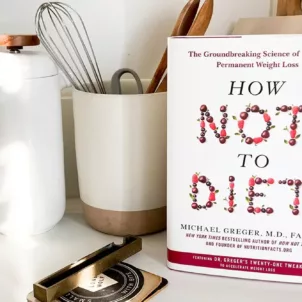Medically Reviewed By
Gaby Vaca-Flores, RDN, CLE
Registered Dietitian Nutritionist
Everybody’s got to eat, and it’s no surprise that chewing is an essential part of that process. With that in mind, how many times are you supposed to chew your food? Also, should you always strive for a specific number?
Below, we look into the science of chewing as it relates to your health, as well as explore the notion that there’s an ideal number of chews.



Does chewing your food help with digestion?
Many people don’t realize that digestion begins in the mouth. Chewing is part of the first way our bodies break down food for energy. A combination of enzymes contained in our saliva, plus the motion of chewing and grinding up food in our mouths, helps break food into small pieces. Those pieces then travel through the esophagus into the stomach. By this time, the food has already started to break down into its many parts, including:- macronutrients (fat, carbohydrates, protein, water)
- vitamins
- minerals

How many times are you supposed to chew your food?
You may have heard that chewing your food 32 times is best. But where did this idea come from, and is there evidence to support it? This number originated from a man named Horace Fletcher, a popular food- and health-faddist who stated that chewing 32 times could prolong life. Yet peer-reviewed studies on this concept, aka Fletcherism, are scarce. Further, studies included below cite both 35 and 40 chews as the magic number. But later, we’ll get to how essential a specific chew count really is.Can you lose weight by chewing your food more?
Despite the lack of conclusive evidence on the overall efficacy of Fletcherism, findings from a 2011 study support his doctrine “by showing that higher chewing counts per bite or mouthful reduce food intake.” Further, the study notes that prolonged chewing may be a part of a good strategy for weight loss. However, it’s worth noting that the study investigated only a low sample size and didn’t support longevity claims.Chewing Slowly Can Promote Satiety
Next, while no specific number of chews will cause weight loss directly, the practice may increase awareness of your body’s hunger and fullness cues. Your stomach and brain communicate all the time. That’s how your brain lets you know it’s time to eat, and similarly communicates when you’re full. However, leptin—the hormone responsible for letting your brain know you’re full—takes about twenty minutes to reach your brain after your stomach is full. That means your stomach can be full and you may not realize it until you’ve eaten past the point of fullness. This may result in overeating and therefore over-consuming calories, which can lead to weight gain. Based on this idea, chewing slowly can promote satiety while requiring fewer calories to get there. The interesting part is there’s some research to back this up.What Studies Say
A 2011 study found that significantly overweight participants ingested a higher quantity of food and chewed fewer times per gram of food. It also found that the subjects ingested less when they were asked to chew 40 times versus 15. This would suggest that chewing more leads to consuming fewer calories. The sample size of this study is small, though, so these results aren’t conclusive. Everybody is different, so a study conducted on 30 people can’t definitively prove much—but it does provide helpful insights. On top of that, another study found that people who ate slowly had increased satiety hormones. Lastly, a much larger study consisting of 2,500 middle-aged women shows that faster self-reported eating speed is related to a higher BMI. And while a higher BMI isn’t inherently negative, this correlation suggests that eating too quickly can increase caloric intake and promote weight gain. In sum, all of the information these studies present supports the notion that eating slowly can successfully help with weight management. Still, be sure to talk to your doctor or a registered dietitian before trying a new weight loss regimen.
What happens when you don’t chew your food properly?
Chewing your food thoroughly ensures that it’s safe to swallow. It also ensures that it’s had enough time to break down for easier digestion. Not chewing your food properly can not only cause digestive problems, but can also be hazardous. If you eat too quickly and don’t chew your food enough, the food you swallow risks being too large, which can then block your airway and lead to choking. Poorly chewed food can also cause:The Importance of Mindful Eating
We’ve seen so far that being mindful of how much you chew may lead to eating less. We’ve seen that it may also promote weight loss. However, taking this process deeper and altering your mindset can produce similar results while still promoting a healthy relationship with food. Mindful eating can help you feel more satisfied, and as a result, you won’t feel the need to consume as much food. Also, since it’s necessary to create a caloric deficit to lose weight, this eating approach may help you reach this goal. Next, consider how focusing on a number may negatively impact your overall relationship with food. Aiming for a specific number of chews may create stress or overwhelm during mealtimes. Plus, for many, it may be difficult to maintain as a long-term habit. That said, instead of fixating on how many times you should chew your food, finding ways to be more mindful when you eat may be more realistic for most.
3 Tips on How to Eat Mindfully
Consider the following tips that are more likely to become sustainable habits and promote a healthy relationship with food:1. Ditch Screens While You Eat
Eating at a table without distractions from screens will help you be more conscious of what you are eating. You’ll also be more likely to eat slowly, thus giving your body more time to digest and promoting fullness sooner. Further, eating slowly with a friend or co-worker will not only help you be more present in real life (instead of scrolling Insta, which many of us are guilty of), but also help you create healthy habits around eating by causing you to eat more slowly.2. Portion out your food into a plate or bowl
Eating straight from the bag or container makes it easy to eat mindlessly and not pay attention to your fullness cues. Instead, portion out your food onto a plate and go back for seconds if you’re still hungry.3. Always listen to your body
Eating well isn’t about restriction, but rather about learning to be in tune with what your body’s needs are. These needs change from day to day, and even over the course of a day. Taking steps to be intentional at mealtimes is a good way to honor your body. Whether you choose to focus on a certain number of chews or not, what’s most important is that you tune into your body’s needs.The Bottom Line
As we saw above, chewing your food up to 32, 35, or 40 times before swallowing may promote satiety and help reduce food intake. Yet overall, it’s more important to chew food fully and slowly than it is to fixate on reaching a specific number of chews. Chewing is an essential part of digestion, and not chewing enough can cause discomfort. Chewing too little can also lead us to over-consume calories, which may result in weight gain. Multiple studies support the idea that chewing slowly can help you eat fewer calories, which is good news if weight management is a concern. Last but not least, focus on being more intentional and present at mealtimes. Doing so can promote a healthy relationship with food by avoiding any stress brought on by hyper-focusing on chewing.More like this









